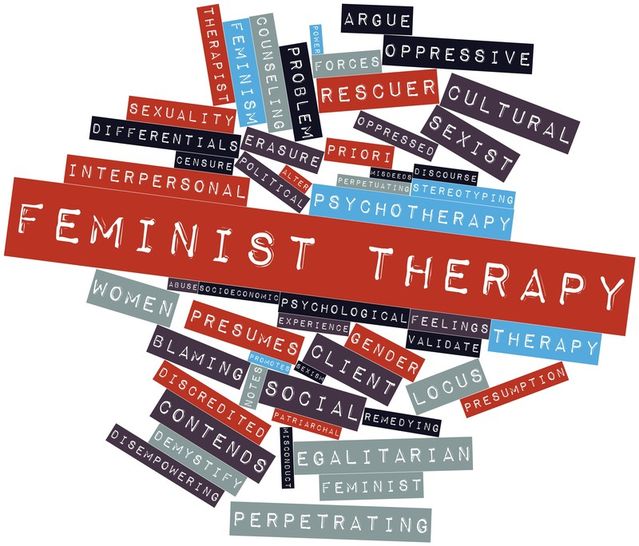Feminist therapy is a form of therapy that focuses on the needs of women. It takes into account the historical and social context in which women live their lives. In this blog post, we will discuss what feminist therapy is, and how it can help women who are struggling with mental health issues.
Contents
What Is Feminist Therapy?

Feminist therapy is an approach to psychotherapy that focuses on the unique challenges women face due to their gender identity. It is based on the idea that women have unique needs. This should be taken into account when providing mental health care. Feminist therapists believe that women’s experiences are influenced by the social and historical context their gender identity entails. It encompasses all aspects of life which can influence one’s mental health. These factors include
- race/ethnicity/religion
- class/caste
- age
- sexuality/gender
- cultural and educational background
- family history
- disability/ableism
Types Of Feminist Therapy
There are four primary schools of thought associated with feminist therapy.
Radical feminism
It reviews oppression from a patriarchal lens. This involves socio-cultural and political effects.
Cultural feminism
Emphasis is given to the cultural and domestic differences between the genders, which further trivializes women’s roles and abilities.
Socialist feminism
It views things from a socio-economic lens and includes societal changes and shifts which deal closely with intersectional marginalization.
Liberal feminism
This school centers around the idea of individual empowerment. It focuses on women taking control of their spheres.
What Happens In Feminist Therapy?

Feminist therapy works on the principle of intersectionality. Intersectionality refers to the idea that various forms of oppression can co-exist at the same time. The therapist will work with the client to identify these factors and how they have affected her life. This can include challenging social norms and oppressive systems. Further plans of action include goal identification and treatment.
Feminist therapy focuses on the whole person, not just her mental health issues. Special emphasis is given to the exploration of a client’s feelings and emotions to understand how they have been affected by her life experiences.
It additionally helps them to understand the factors that have contributed to their mental health problems and provides them with a safe space to explore these issues. In a collaborative attempt to provide an increased sense of support and understanding, the therapist may indulge in some appropriate self-disclosure.
It is important to acknowledge the fact that oppression is systematically rooted in the social, cultural, and legal aspects of life. While it is impossible to dismantle these systems, an inclusive approach to therapy can help in sensitization toward the stigma.
Techniques Used In Feminist Therapy
Feminist therapy is more of a principle than a theoretical approach. Examples of some common methods are:
Collaborative dialogue
It involves working with the client to identify the factors that have contributed to her mental health problems. It also helps the therapist understand how these factors have affected her life.
Power play analysis
This helps the client and therapist examine the areas wherein women are subjected to control by their male counterparts. Through this exercise, the client can get more clarity on which perspectives need more regain or balance of power.
Bibliotherapy
Involves active reading to make sure the client feels informed and understood and learns new things.
Deconstruction Overdiagnosis
This focuses more on exploring which areas of oppression could be the cause of which symptom.
Reframing
It can help a client contextualize their experience in a broader perspective since oppression doesn’t exist in isolation. This also helps in normalizing differing life experiences and making people feel included.
What Does Feminist Therapy Help With?

There is no one answer to this question. Feminist therapy aims to help women understand how their lives get shaped by gender identity and the social context it follows.
It encourages them to challenge oppressive systems and work towards self-empowerment. Hence, the ultimate goal is for the client to achieve mental health and well-being.
Feminist therapy can further help women who are struggling with a variety of mental health issues, including anxiety, depression, and eating disorders. It provides a safe space for women to explore the unique challenges and systematic oppression they face due to their gender identity.
It also helps women develop a better understanding of themselves and their relationships with other women having similar struggles. This can further lead to improved mental health and increased self-esteem. Moreover, it provides for open conversations about matters which usually go unnoticed or unaddressed.
In the case of disorders like anxiety, PTSD, or depression, a deeper understanding of the symptoms can help one reflect on the stressors and work towards eliminating or eventually reducing them.
Who Can Benefit From Feminist Therapy?

Feminist therapy can benefit anyone who identifies as a woman. This also includes transgender women, non-binary or genderfluid individuals, or those who do not conform to traditional gender stereotypes. It is a rather inclusive approach that takes into account the diverse experiences of women from all walks of life. Men, as allies, can also undertake a feminist approach to therapy to understand how they can unlearn patriarchy-induced ideas and thoughts to make things better for women. Moreover, it is open to anyone who wants to work towards social justice and develop a better understanding of themselves and their relationships with others.
Conclusion
Feminist therapy can help women who are struggling with a variety of mental health issues, including anxiety, depression, and eating disorders. It provides a safe space for women to explore the unique challenges they face due to their gender identity. Additionally, it helps women develop a better understanding of themselves and their relationships with others. This can moreover lead to improved mental health and increased self-esteem.
A Word From Therapy Mantra
Your mental health — Your psychological, emotional, and social well-being — has an impact on every aspect of your life. Positive mental health essentially allows you to effectively deal with life’s everyday challenges.
At TherapyMantra, we have a team of therapists who provide affordable online therapy to assist you with issues such as depression, anxiety, stress, workplace Issues, addiction, relationship, OCD, LGBTQ, and PTSD. You can book a free therapy or download our free Android or iOS app.


